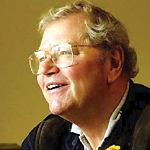|
Toby Balding
Late The Life Guards
|
 Gerald Barnard Balding was born on 23rd September 1936 in the United States; his mother was American, and his father (also Gerald) was both a racehorse trainer and captain of the England polo team. To avoid family confusion, Gerald junior became known as Toby, after his father’s great friend Lord (Toby) Daresbury. Both he and his brother Ian, born two years later, spent their early years in New Jersey with their mother’s family before being sent to Marlborough. After National Service with The Life Guards, Toby became assistant trainer to his father. Gerald senior trained at Weyhill in Hampshire, where his principal patron was Jock Whitney, the racehorse owner, polo player, publisher of the New York Herald Tribune and US Ambassador to London under President Eisenhower. When Gerald died, aged only 54, Whitney backed the idea that Toby should take over the stables; at only 20, he found himself the youngest trainer in Britain. Gerald Barnard Balding was born on 23rd September 1936 in the United States; his mother was American, and his father (also Gerald) was both a racehorse trainer and captain of the England polo team. To avoid family confusion, Gerald junior became known as Toby, after his father’s great friend Lord (Toby) Daresbury. Both he and his brother Ian, born two years later, spent their early years in New Jersey with their mother’s family before being sent to Marlborough. After National Service with The Life Guards, Toby became assistant trainer to his father. Gerald senior trained at Weyhill in Hampshire, where his principal patron was Jock Whitney, the racehorse owner, polo player, publisher of the New York Herald Tribune and US Ambassador to London under President Eisenhower. When Gerald died, aged only 54, Whitney backed the idea that Toby should take over the stables; at only 20, he found himself the youngest trainer in Britain.
His career as a racehorse trainer was to be a distinguished one, during which he had the rare distinction of winning National Hunt’s so-called ‘holy trinity’: the Grand National, Champion Hurdle and Cheltenham Gold Cup. Toby hailed from a powerful racing dynasty: his father was a trainer, while his younger brother Ian sent out the 1971 Derby winner Mill Reef and was later succeeded by his son Andrew, who won the Oaks in 2003 with Casual Look. Ian’s daughter (and Toby’s niece) Clare Balding, is the celebrated racing pundit and television presenter. Having won the Grand National in 1969 with Highland Wedding, Toby Balding repeated the feat 20 years later with Little Polveir. He was also notable for his ability to recognise potentially outstanding young jockeys; it was Toby who introduced a young AP McCoy to the British racing public when he brought him over from Ireland in the 1994-95 season; McCoy duly became champion conditional jockey, and has since been Champion Jockey 19 years’ in succession. Balding also fostered the careers of riders such as Bob Champion, Richard Linley and Adrian Maguire.
Although it was over the jumps that he excelled, Toby Balding’s 2,000-plus winners included successes on the Flat. And he liked to have a touch. Perhaps the best known was in the 1959 Portland Handicap, when the gamble was on New World, owned by the Hong Kong media mogul and philanthropist Sir Run Run Shaw. According to Balding, Shaw’s interest in racing was ‘entirely betting motivated’, and it was decided to target one of Britain’s big handicaps. This successful campaign was capped by victory, with Balding having got on at 33-1 and winning enough to buy Fyfield, his future training base, from his mother just before his wedding.
On another occasion, in the early 1980s, the gambling intentions of one of Balding’s owners developed into a kind of farce. Gunnar Schjelderup, a Norwegian Davis Cup tennis player and keen punter, sent Balding two horses, one a Polish Champion Hurdler, the other a complete novice, and they were inadvertently put in the wrong stables. The horses looked nothing like their descriptions on their respective passports, and on the schooling ground the ‘Polish Champion’ broke every hurdle, while the ‘complete novice’ jumped like a stag. But no one appeared to notice.
On the day when both were due to run, one at Exeter and one at Nottingham, Schjelderup arranged to have his usual massive punt. The authorities at Nottingham, noting that his runner looked nothing like the horse in the passport, withdrew him from the race. At Exeter, however, the Polish horse, despite resistance from a by now alarmed Balding, was allowed to run, and it duly hacked up at 5-1, thwarting a big gamble on the favourite. The horse was eventually disqualified, and the trainer fined £400 by the Jockey Club; but, in the meantime, Schjelderup had been paid out by the bookies, with all his doubles going on to the one horse. The Norwegian, innocent of the rules of racing, asked Toby Balding: ‘Can we do it again?’
He later moved from Weyhill to Fyfield, remaining, apart from a brief interlude in Dorset, in the Test Valley of Hampshire for the rest of his career, finally building a new yard at nearby Kimpton Down. Balding retired after 48 years as a trainer in 2004 owing to the failing health of his wife, Caro, who died later that year. The yard at Kimpton was taken over by his son-in-law, Jonathan Geake. A founder of the National Trainers’ Federation, Toby continued to serve the sport in his retirement. He was on the board of the British Horseracing Authority and was elected an honorary member of the Jockey Club. He was appointed OBE in 2011.
Toby Balding died on 25th September 2014 aged 78, and is survived by his son and two daughters.
With thanks to The Daily Telegraph. |
|